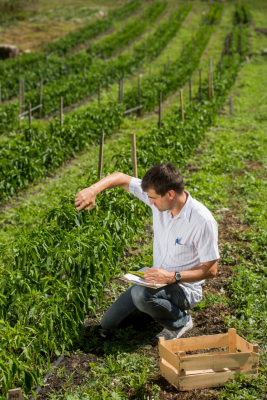Why is organic good?
Organic products contain fewer residues
Chemical substances such as synthetic fungicides or pesticides have become widely used in conventional agricultural production, and their residues can often be found in the produce we consume. The level of residues, if measured per product, are usually below the health-based limits (in 95% of cases in the European Union), although in most cases, residues of not only one, but several (even up to a dozen) different synthetic molecules can be detected in a vegetable, a fruit or a cereal.
As no synthetic plant protection products are used during their production, most organic products have no detectable residues on them. Obviously, organic farmers cannot avoid the pollution coming from the environment, but the chemical burden and risk is much lower in case of organic farming.
Organic products are usually fresh and free from additives
As they do not contain any flavor enhancers or artificial preservatives, organic products usually do not have a long shelf-life. On organic and farmers’ markets fresh produce dominates, often having been harvested that very morning.
A good choice for the environment
Organic production methods preserve the cleanliness of our waters, enhance soil productivity, pose a reduced environmental burden and spare the useful or harmless elements of the ecological network. And what is good for the environment, is good for you too.
Animal welfare
When rearing animals in an organic setting, no preventive antibiotics or growth hormones can be used. In organic agriculture, cutting off body parts of the animals, such as dehorning of milk producing cows, beak trimming in laying hens or cutting the tails of pigs, is prohibited.
In addition, the animals are kept free range, or they have access to outside areas for moving around. Therefore, they are not torn from their natural environment and not limited in meeting their basic needs.
Being GMO-free
Using genetically modified organisms or their derivatives is prohibited in organic farming, and this applies to organic feed as well.
Organic farming is based on the observation of natural systems. Organic farmers see an organism as an individual whole, and not as a collection of genes. The dignity of living creatures is of higher value.
Coherence
Organic farmers use seeds and propagating materials produced via organic methods or at least not treated with chemicals. As a result, even young plants comply with the requirements of organic farming.
With every new organic area, the transition to organic farming takes at least two years. All relevant provisions have to be observed during the transition period as well. This waiting period ensures that organic products contain fewer plant protection product residues that may have been left from the previous land use. During the transition period, the products from these plants are handled separately.
.jpg)










